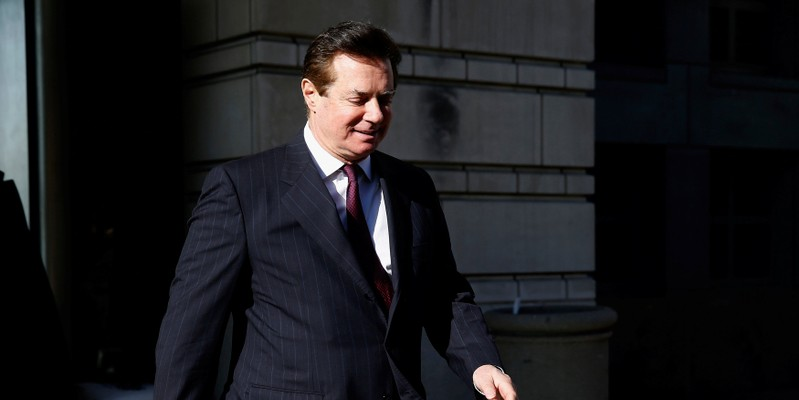- Rudy Giuliani told Business Insider that Paul Manafort’s cooperation deal with the special counsel Robert Mueller does not include an agreement to share information about President Trump or the Trump campaign.
- Manafort’s plea agreement does not include an exception for topics related to Trump or his campaign.
- A prosecutor on Mueller’s team also told a federal judge that Manafort will cooperate “in any and all matters as to which the government deems the cooperation relevant,” including “testifying fully, completely” before a grand jury.
- Justice Department veterans cast additional doubt on Giuliani’s claims, saying that Mueller would not have agreed to a cooperation deal with the former Trump campaign chairman if he didn’t think it could snag him a bigger fish.
Following news on Friday that Paul Manafort had struck a plea deal with prosecutors and agreed to cooperate with the Russia investigation, President Donald Trump’s personal defense attorney said he wasn’t worried about the president’s potential legal exposure.
“Paul Manafort is not going to talk to [the special counsel] Robert Mueller about Trump or the Trump campaign,” Rudy Giuliani told Business Insider in a phone interview Friday evening. “His cooperation deal does not include an agreement to do that. He’s only cooperating on matters related to the two indictments against him and others named in those indictments.”
He added that as of Friday evening, Manafort had not withdrawn from his joint defense agreement with Trump.
Giuliani doubled down on his statement Saturday morning, tweeting, “According to sources close to Manafort defense: ‘The coooeration [sic] agree does not involve the Trump campaign….There was no collusion with Russia.’ Another road travelled by Mueller. Same conclusion: no evidence of collusion President did nothing wrong.”
Jeffrey Cramer, a longtime former federal prosecutor who spent 12 years at the Justice Department, said that while Giuliani's statement could theoretically be true, it's unlikely that Mueller would agree to a cooperation deal with the former chairman of the Trump campaign if it didn't help him snag a bigger fish.
"If you're Mueller, the reason you pursue this against Manafort, and appropriately so, is to squeeze him," Cramer said.
Crucially, Manafort's plea agreement with Mueller's office does not include an exception for information related to his time on the Trump campaign.
Moreover, Andrew Weissmann, a prosecutor working for Mueller, told US District Judge Amy Berman Jackson that Manafort will cooperate "in any and all matters as to which the government deems the cooperation relevant," including "testifying fully, completely" before a grand jury.
"Take Weissmann's sentence and juxtapose that with what Giuliani said," Cramer said. "As a general rule, you go with the people arguing before a judge in court, and who have the evidence to back up their claims."
Weissmann headed up the Enron Task Force between 2002 and 2005, for which he oversaw the prosecutions of 34 people connected to the collapsed energy company. He also spent 15 years as a federal prosecutor in the eastern district of New York, where he specialized in prosecuting mafia members and bosses from the Colombo, Gambino, and Genovese families.
"Weissmann is a respected prosecutor who has worked some massive cases," Cramer said. "And he's not going to make a representation in court if it isn't 100 percent true. Between what he said and what Giuliani said, it's not even a close call."
'The way it works with federal cooperation is it's all or nothing'

In addition to giving Mueller more information about his own case, Manafort could also help him connect the dots on several pivotal events that occurred while he was spearheading the Trump campaign and even after.
Those include Russia's hack of the Democratic National Committee; his offer of "private briefings" about the campaign to a Russian oligarch; and former Trump lawyer John Dowd's reported efforts to dangle pardons for him and former national security adviser Michael Flynn last summer if they stayed mum during the investigation.
Most importantly, he can give Mueller a firsthand account of a June 2016 meeting at Trump Tower between top campaign officials and two Russian lobbyists.
Manafort attended the meeting along with Donald Trump Jr. and senior adviser Jared Kushner. Trump Jr. initially released a statement saying the meeting was a non-event and unrelated to campaign business.
He had to amend the statement several times as new details about the meeting spilled out in public view. Eventually, it emerged that Trump Jr. agreed to the meeting after he was offered kompromat on Hillary Clinton as "part of Russia and its government's support" for Trump's candidacy.
The president and his lawyers said at first that they had no knowledge of the meeting until The New York Times first reported it last July. But The Washington Post later reported that Trump "dictated" the initial statement his son put out about the meeting.
The meeting, and any subsequent efforts to cover up its purpose, now make a up one of the biggest threads of the Russia probe that Manafort may help shed light on.
Elie Honig, a former Justice Department lawyer who prosecuted hundreds of organized crime cases, said there was no doubt that Manafort would talk to Mueller about the campaign meeting.
"The way it works with federal cooperation is it's all or nothing," he said. "The cooperator doesn't just talk about select people or categories. They have to talk about everything they've ever done, all the criminal activity they knew about, every crime they've committed."
Circling back to Giuliani's claim, Cramer said, "One of two things is true here. Either Rudy is wrong, or Mueller doesn't think the meeting with Russians and Trump officials during the campaign is relevant. I'm going with, Rudy is wrong."
Michelle Mark contributed reporting.

